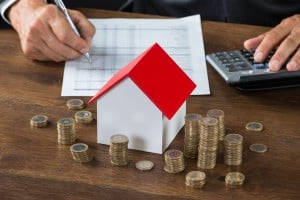So, you’re thinking about starting a property portfolio but you don’t think you’re ready yet.
Or maybe you think you don’t have what it takes to get started.
You’re not alone.
Many aspiring property investors grapple with the same challenge.
Investing in property is a big commitment.
It involves a lot of money.
It involves taking a leap into the unknown.
As such, it’s natural to make sure you’re prepared, both financially and emotionally.
However, it’s also important to realise that you don’t have to have everything ready before you start.
If you’re waiting for everything to line up, you could be waiting for a very long time.
You could end up missing out on a lot of great buying opportunities.
Waiting for your ducks to line up, so to speak, could lead to you procrastinating and never taking action towards your goal.
So, what are the things you don’t need to get started now?
Credit card
Some people will say, ‘go out and get a credit card or a car loan to build up a credit rating’, which you might have to do depending on your situation.
However, don’t assume you have to, says Zoran Solano, a buyer’s agent.
“I personally got a mortgage before I got a credit card,” says Solano.
“The reason I caution you about getting a credit card is because they affect your serviceability.
Even if you have never maxed out your credit card, the lender will take into account the credit card limit you have and use it to calculate how much you can borrow.
“So, if you have a $5,000 limit, for example, this will reduce your borrowing capacity when being assessed by the banks.
Therefore, where possible, reduce your credit card limits or cancel unused credit cards.”
Experience
Just because you haven’t bought a property before doesn’t mean you can’t get started now.
The only way to get the experience is by actually doing it.
You won’t be able to buy property number two if you haven’t bought property number one.
You have to start where you are.
It can be daunting and scary, but remember that you can always tap experienced professionals to help you.
This will cost money, but it will also help you avoid costly mistakes that will come and bite you later on.
“If you have the right team around you to guide you through finance, accounting, finding the right property and property management, you don’t need any experience, just the willingness to get into the market,” says Solano.
100% knowledge
While getting educated ensures that you’re not going in blind, Chris Gray, buyer’s agent , says you don’t need to know everything before you jump in.
“You don’t need to be an expert about property investing before you start,” says Gray.
“You can certainly read up about the strategies and so on, but don’t wait until you think you know everything before starting up.
You learn most things by actually doing them.”
Lots of money
It’s true that buying a property requires a bigger cash outlay than other assets, but you don’t need hundreds of thousands of dollars to get started.
All you need is enough money to cover the deposit and buying costs such as stamp duty, legals, inspections and so on.
I’ve come across so many low to average income earners who have successfully built impressive portfolios during my time as the managing editor of Your Investment Property magazine.
It’s not always how much you earn, but actually what you’re doing with that income that matters when it comes to lending.
As long as you can show the bank that you’re financially responsible, you can get a mortgage even on a low or average income.
100% confidence in the market
The reality is that no one can predict how the property markets will perform.
There are factors that are beyond your control that could impact your investment.
An element of risk is a part of investing no matter what asset class you choose.
“As long as you have enough cash to hold on for long enough, even if the market does go down, it should rise in the long term,” says Gray.
A trust structure 
Having a trust structure basically means you’re able to maximise your tax benefits while protecting your assets.
If you’re just starting out, you don’t have to concern yourself with setting this up.
Talk to your accountant first about the best structure for your portfolio, but don’t let this hold you back or cause you to procrastinate.
The essentials: What you must have to get started as an investor
A plan
You need to have a plan or investment strategy for each investment purchase you make, says Solano.
“Some purchases may involve adding value to create equity, or perhaps some will be for future potential development, or maybe even just a low maintenance set and forget property.
But you need to work out how each property fits your overall strategy.”
Your big why
Getting clear about why you’re investing is crucial.
“This is the biggest thing when you’re starting out because it’s what fuels you to take action,” says Gray.
Therefore, before you start doing anything else, you need to fully understand what’s driving you to invest in property.
Is it for lifestyle?
To quit your day job?
To retire sooner and richer?
Be clear about why you want to invest in property.
Basic budget 
You need a clear understanding of how much you earn and how much you owe.
This helps you to see whether you could afford to buy now or if you need to improve your cash position first.
Having a clear picture of your finances also enables you to see where you can cut back on your expenses to boost your cash flow.
Deposit
You do need to come up with at least 10% deposit to be able to get a loan.
The size of your deposit depends on the amount you can borrow so work with your broker to determine how much you need.
There are many ways to gather the required deposit if you’re short on cash.
Make sure you check with your mortgage broker first on what’s acceptable with the lender before you start asking your parents to stump up the deposit.
Buffer
Having enough of a cash buffer to tap into in case of emergency or if there’s a vacancy or change in your financial situation helps you sleep better at night.
Some investors have six months worth of mortgage repayments while others have up to three years.
The amount you need depends on your situation and how much you think you need to be able to hold onto your property if the worst case scenario happens.
Mortgage broker
A good mortgage broker who’s used to dealing with investors and is an investor themselves is indispensable right from the start.
You need them to help you figure out how much you can borrow based on your budget. They can also educate you about the different mortgage options and structures.
They can also give you advice on how much deposit and cash buffer you need. If you don’t have enough saved, they can help you set up your savings goals.
Accountant 
You also need to have an investor-focused accountant to help ensure that you’re maximising your tax benefits and your properties are structured correctly.
The cost of putting off your investment journey Gray estimates that it’s costing you roughly $1,000–2,000 for every week you delay getting into the market.
He explains:
“If you bought a $500,000 property and it grows 5–10% a year, it could be growing anywhere between $25,000 and $50,000 a year, or $100,000 on a million-dollar property.
“Even at a very conservative growth of say $50,000 a year, that’s about $1,000 a week growth that you’re missing out on.
You need to start looking at your excuses and decide whether they’re worth giving up $1,000 for.”





















